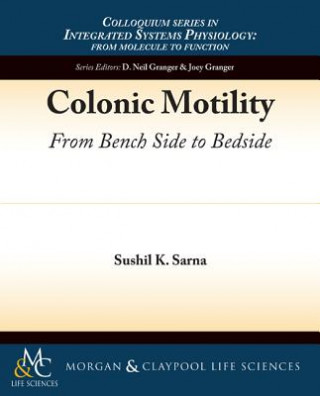
Kód: 04838995
Colonic Motility
Autor Sushil Sarna
Three distinct types of contractions perform colonic motility functions. Rhythmic phasic contractions (RPCs) cause slow net distal propulsion with extensive mixing/turning over. Infrequently occurring giant migrating contractions ... celý popis
- Jazyk:
 Angličtina
Angličtina - Vazba: Brožovaná
- Počet stran: 157
Nakladatelství: Morgan & Claypool Publishers, 2010
- Více informací o knize

Mohlo by se vám také líbit
-

Colonic Diseases
3584 Kč
Darujte tuto knihu ještě dnes
- Objednejte knihu a zvolte Zaslat jako dárek.
- Obratem obdržíte darovací poukaz na knihu, který můžete ihned předat obdarovanému.
- Knihu zašleme na adresu obdarovaného, o nic se nestaráte.
Více informací o knize Colonic Motility
Nákupem získáte 137 bodů
 Anotace knihy
Anotace knihy
Three distinct types of contractions perform colonic motility functions. Rhythmic phasic contractions (RPCs) cause slow net distal propulsion with extensive mixing/turning over. Infrequently occurring giant migrating contractions (GMCs) produce mass movements. Tonic contractions aid RPCs in their motor function. The spatiotemporal patterns of these contractions differ markedly. The amplitude and distance of propagation of a GMC are several-fold larger than those of an RPC. The enteric neurons and smooth muscle cells are the core regulators of all three types of contractions. The regulation of contractions by these mechanisms is modifiable by extrinsic factors: CNS, autonomic neurons, hormones, inflammatory mediators, and stress mediators. Only the GMCs produce descending inhibition, which accommodates the large bolus being propelled without increasing muscle tone. The strong compression of the colon wall generates afferent signals that are below nociceptive threshold in healthy subjects. However, these signals become nociceptive; if the amplitudes of GMCs increase, afferent nerves become hypersensitive, or descending inhibition is impaired. The GMCs also provide the force for rapid propulsion of feces and descending inhibition to relax the internal anal sphincter during defecation. The dysregulation of GMCs is a major factor in colonic motility disorders: irritable bowel syndrome (IBS), inflammatory bowel disease (IBD), and diverticular disease (DD). Frequent mass movements by GMCs cause diarrhea in diarrhea predominant IBS, IBD, and DD, while a decrease in the frequency of GMCs causes constipation. The GMCs generate the afferent signals for intermittent short-lived episodes of abdominal cramping in these disorders. Epigenetic dysregulation due to adverse events in early life is one of the major factors in generating the symptoms of IBS in adulthood. Table of Contents: Introduction / Regulatory Mechanisms / Colonic Motility in Health / Colonic Motility Dysfunction / References
 Parametry knihy
Parametry knihy
Zařazení knihy Knihy v angličtině Mathematics & science Biology, life sciences Zoology & animal sciences
1370 Kč
- Plný název: Colonic Motility
- Autor: Sushil Sarna
- Jazyk:
 Angličtina
Angličtina - Vazba: Brožovaná
- Počet stran: 157
- EAN: 9781615041503
- ISBN: 1615041508
- ID: 04838995
- Nakladatelství: Morgan & Claypool Publishers
- Hmotnost: 300 g
- Rozměry: 235 × 187 × 9 mm
- Datum vydání: 01. November 2010
Oblíbené z jiného soudku
-

Field Guide to the Birds of Cuba
615 Kč -

Handbook of Western Palearctic Birds
4119 Kč -

Mammals of Costa Rica
615 Kč -

Bach Flower Remedies For Animals
543 Kč -

Wolves
830 Kč -

Birds of Japan
955 Kč -

Birds of Argentina and Southwest Atlantic V 1
852 Kč -

Fishes of Indiana
634 Kč -

End of the Megafauna
884 Kč -

Reef Fish Identification
974 Kč -

Essentials of Clinical Anatomy of the Equine Locomotor System
2068 Kč -

Complete Illustrated Encyclopedia of Birds of the World
547 Kč -

Complete Field Guide to Butterflies of Australia
1156 Kč -

Beetles
1745 Kč -

Wisdom of Wolves
639 Kč -

In The Shadow Of Man
465 Kč -

Butterflies of North America
1568 Kč -

Anatomy of the Horse
2109 Kč -

Centipedes in Captivity
1731 Kč -

Nature of Horses
276 Kč -

Rise of Marine Mammals
2100 Kč -

Birds of Southeast Asia
884 Kč -

Dragonflies and Damselflies of the West
751 Kč -

Comparative Osteology
1980 Kč -

Handbook of Larval Amphibians of the United States and Canada
2826 Kč -

Field Guide to the Birds of Thailand
1169 Kč -

Bumblebees
826 Kč -

Field Guide to the Birds of Hawaii and the Tropical Pacific
1295 Kč -

RSPB Guide to Birdsong
482 Kč -

Why Big Fierce Animals Are Rare
399 Kč -

Principles of Thermal Ecology: Temperature, Energy and Life
2317 Kč -

Sea Shells of India
1438 Kč -

Solitary wasps
904 Kč -

Dance Language and Orientation of Bees
2108 Kč -

Prairie Dog Empire
544 Kč -

Extreme Measures - The Ecological Energetics of Birds and Mammals
1465 Kč -

National Audubon Society Guide to Marine Mammals of the World
855 Kč -

Tracks and Signs of the Animals and Birds of Britain and Europe
930 Kč -

Chimpanzee Politics
1025 Kč -

Aqualog Freshwater Rays
706 Kč -

Birds of Mexico and Central America
655 Kč -

Fishes of the Maldives
1369 Kč -

Birds of Central Asia
1251 Kč -

Birds of Oman
1086 Kč -

Rabbit Behaviour, Health and Care
664 Kč -

Turtles of the World
1803 Kč -

Are You My Mother?
224 Kč -

Lives of Bees
742 Kč -

Zoo Animal Learning and Training
1686 Kč
Osobní odběr Praha, Brno a 12903 dalších
Copyright ©2008-24 nejlevnejsi-knihy.cz Všechna práva vyhrazenaSoukromíCookies



 Vrácení do měsíce
Vrácení do měsíce 571 999 099 (8-15.30h)
571 999 099 (8-15.30h)